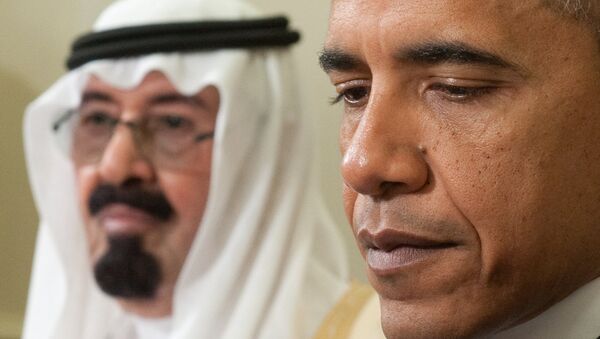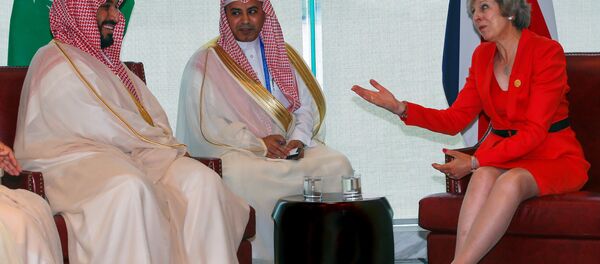The Senate voted 71 to 27 on Wednesday, September 21, to kill a proposal that would have stopped the mass sale of weaponry to one of the US' key allies in the Middle East.
Senate Majority Leader McConnell told reporters in the run up to the vote:
"I think it's important to the United States to maintain as good a relationship with Saudi Arabia as possible."
However, a senate resolution to oppose the deal garnered the support of 27 senators on Wednesday, in a sign of the growing unease about the increasing number of civilians being killed with US made weapons.
"There is a US imprint on every civilian death inside Yemen, which is radicalizing the people of this country against the United States," said Senator Chris Murphy.
Never before have so many Senators gone on record supporting a rethink of the US-Saudi relationship. Didn't win, but a strong message.
— Chris Murphy (@ChrisMurphyCT) September 21, 2016
The United Nations has estimated that at least 10,000 people have been killed in Yemen since the conflict began over 18 months ago.
.@UN: 10,000 dead in #Yemen's civil war and 3 million+ displaced#Anonymous pic.twitter.com/sWbGhkR5O1
— Anonymous (@LatestAnonNews) September 3, 2016
Throughout 2016, several human rights organizations including the UN, Human Rights Watch and Amnesty International have condemned the Saudi-led coalition for indiscriminately killing civilians in Yemen, which they say amounts to a war crime.
The Yemen civil war is a strategic battleground for the regional power-houses of Saudi Arabia and Iran. In February 2015, Zaidi Shia rebels known as Houthis, forced the President, Abdrabbuh Mansour Hadi, to flee the capital Sanaa, destabilising the whole country.
Thank you to the 27 Senators who voted to #StopArmingSaudi! Although we didn't win, we gained new allies in ending crisis in #Yemen. pic.twitter.com/1vJeCXVi4v
— Oxfam America (@OxfamAmerica) September 21, 2016
Saudi Arabia was quick to intervene, assembling a coalition of nine Arab states, backed by the US and UK. The Saudis have repeatedly labeled the Houthis as Iranian proxies, an accusation Tehran continues to vehemently denied. Despite this, both sides have been accused of acting with impunity, bombing and firing at a range of civilian targets including hospitals and schools.
In August, the same month the Obama administration announced the multi-million dollar Saudi arms deal, the Saudi Arabian coalition bombed a children's school; the home of the school's principal; a Doctors Without Borders hospital; the bridge used to carry humanitarian aid into the capital; and a potato chip factory in the besieged Yemeni capital.
We must send a message right now, today to Saudi Arabia: Stop putting Christians to death, stop beheading protesters, stop the abuse.
— Dr. Rand Paul (@RandPaul) September 21, 2016
On Tuesday, September 20, this week, President Obama gave his swan song final speech to the UN General Assembly in New York, in which he pushed other world leaders to respect human rights across the world.
"As imperfect as they are, the principles of open markets and accountable governance, of democracy and human rights and international law that we have forged, remain the firmest foundation for human progress in this century."
The human rights organization has condemned Obama's "astonishing" and "vast flood of weapons" to repressive Middle East regimes.
Sunjeev Bery, the advocacy director for Middle East and North Africa issues at Amnesty International US, told reporters before the vote:
"One of the unspoken legacies of the Obama administration is the extraordinary uptake in the amount of U.S. weapons and military aid that are provided to major U.S. allies like Saudi Arabia, Israel and Egypt that have terrible records when it comes to human rights."
It's not just the US government who is facing such pressure.
The UK government is facing a legal challenge, brought by the Campaign Against the Arms Trade (CAAT). In July, the anti-arms trade campaigners won the right to fight Britain's licensing of weapons sales to Saudi Arabia.
A High Court judge in London ruled that CAAT has an "arguable case" that there had been an unlawful failure to suspend existing deals which could result in the weapons being used in the war in Yemen.
Despite the majority of legislators in the UK and US continuing to at least publicly back Saudi Arabia, many remain worried that the West's involvement in another Middle Eastern conflict, could result in further radicalization against the West.
Senator Chris Murphy, warned that America would be blamed for the humanitarian disaster in Yemen.
"There have already been thousands and thousands of civilians killed," said Senator Murphy.
"If you talk to Yemenis, they will tell you that this is perceived inside Yemen as not a Saudi-led bombing campaign, which it's broadly advertised in the newspapers, but as a US bombing campaign or at best a US-Saudi bombing campaign."





